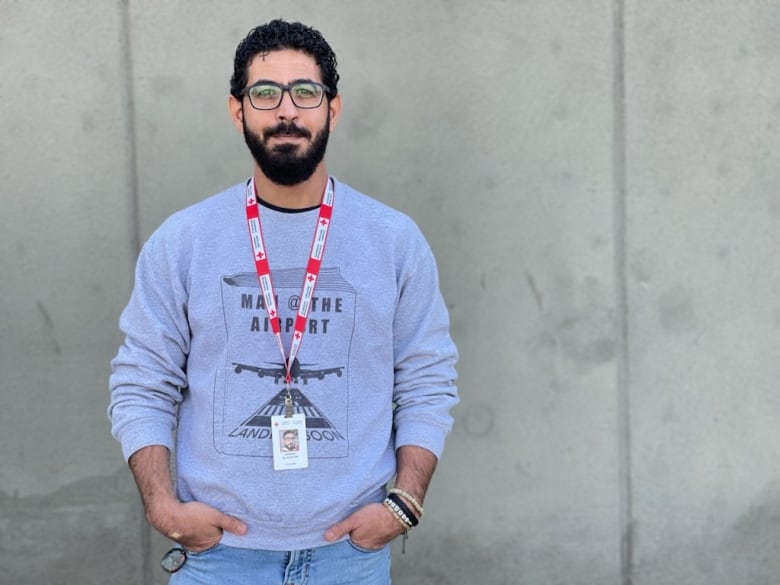Former Syrian refugee cries foul at ‘racist’ media coverage of Ukraine war
A former Syrian refugee living in British Columbia says he’s upset by the way some media outlets are portraying people fleeing the Russian invasion of Ukraine compared to how they speak about refugees from countries in the Middle East and Africa.
Hassan Al Kontar, who works with the Red Cross in Fort St. John, B.C., says he feels a great level of solidarity with Ukrainians but doesn’t appreciate what he says are some journalists’ stereotypes that non-European countries are uncivilized.
In one example, a CBS correspondent in Kyiv recently said in a live report: “This isn’t a place, with all due respect, like Iraq or Afghanistan, that has seen conflict raging for decades — this is a relatively civilized, relatively European [country]… where you wouldn’t expect that or hope that it’s going to happen.”
Countries like Iraq, Afghanistan and Syria are “the oldest civilizations on Earth,” Al Kontar tweeted in his criticism of reporter Charlie D’Agata, who later apologized after the clip was widely condemned on social media.
Al Kontar is one of many people calling out what they say is racism in western media outlets’ inaccurate presumption that refugees are people of colour coming from outside Europe — during a time when fleeing Ukrainians are being welcomed by European leaders who, at the same time, shun asylum seekers from countries like Nigeria, India and Lebanon.

In another example, a columnist for the Daily Telegraph in the U.K. came under fire for writing that the sight of Ukrainian refugees fleeing their country was shocking because they “seem so like us.”
“War is no longer something visited upon impoverished and remote populations,” Daniel Hannan wrote. His column was criticized for suggesting that white lives matter more than Black and brown ones.
‘Need to get the facts straight’
Al Kontar, 40, made international headlines in 2018 when he was stranded in Malaysia’s Kuala Lumpur International Airport for nearly seven months. He settled in Whistler, B.C., in January 2019 thanks to sponsorship from a group of residents there, before he moved to Fort St. John.
As a former refugee whose home country is ruled by a dictatorship backed by Russia, he says he empathizes with Ukrainians.
“We know exactly how they feel and our hearts go with them — because we have been there,” he told host Carolina de Ryk on CBC’s Daybreak North.

But to assume refugees never come from Europe is plain wrong, he says, citing the fact that the office of the United Nations High Commissioner for Refugees (UNHCR) was created in 1950 to help millions of Europeans who had fled their homes after the Second World War.
“We cannot even be equal as human beings,” he said. “They [journalists] are educating people — they need to get the facts straight.”
Hassan Al Kontar says he understands what Ukrainians are going through, but is critical of western media’s portrayal of the situation. 8:24
‘Us and them’ narrative
Nathan Andrews, a political science professor at McMaster University in Hamilton, Ont., says while media outlets have always perpetuated the dichotomy of “us and them” in news coverage, it’s striking to see how some lives are still perceived as more important than others.
“We’re actually just ignoring the reality and creating the impression that bad things only happen to other people, and other people here would mean Black or brown people elsewhere in the world,” Andrews said.
“You cannot just talk about a group of people being uncivilized. Conflicts are not necessarily tied to particular parts of the world … we should pay attention to these nuances when reporting and not just lump everything together.”
Al Kontar says “ordinary people” can help change these narratives by calling out what he describes as divisive remarks that discriminate against certain groups and by offering support to anyone who is need — like he once was.
“People, ordinary people, they have the power. I said that three years ago, when they changed my life, when they gave me a second chance, when they granted me a safe solution here in Canada, when they accepted me,” he said.
Source: Former Syrian refugee cries foul at ‘racist’ media coverage of Ukraine war | CBC News
The views expressed in this article belong to the author and do not necessarily reflect the editorial policy of the Observatory.

